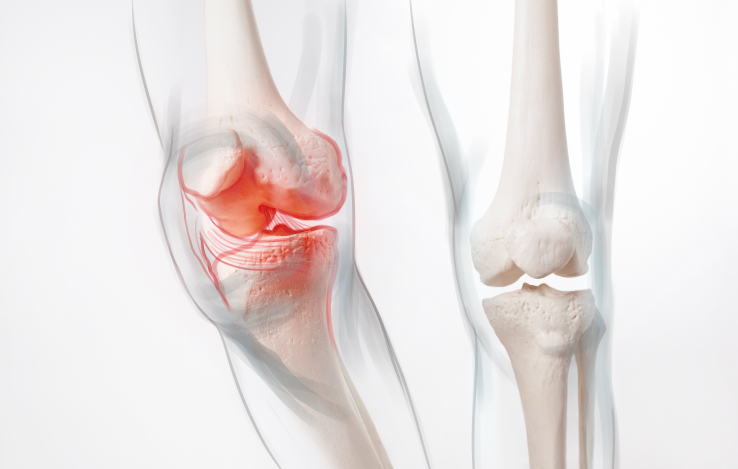Knee Care Issues

If you are experiencing knee discomfort, you are not alone—and you do not have to live with it. At our specialist knee clinic, we are here to help you understand what is going on and guide you towards treatment options that suit your needs and lifestyle. Our goal is to help you move with comfort and confidence again.
Your knees do a lot of heavy lifting—from helping you walk and climb stairs to supporting your weight during everyday activities. As hinge joints, they allow your legs to bend and straighten smoothly. However, because they work so hard, knees are also more likely to suffer from pain or injury over time. Whether it is due to ageing, a sports injury, or an underlying condition like arthritis, knee problems can make simple movements uncomfortable or even painful. You might feel stiffness, swelling, or instability that affects your ability to stay active or enjoy daily life.
The posterior cruciate ligament (PCL) and anterior cruciate ligament (ACL) are key ligaments in the knee, working together to stabilise the joint during various movements. When they experience sudden and excessive force or trauma, they can become stretched or torn, resulting in a tear.
A knee cartilage injury can stem from various causes, including ageing, overuse, trauma, or repetitive strain. There are two common types of knee cartilage injuries: articular cartilage injury and chondromalacia patella.
Articular cartilage injury refers to damage of the smooth tissue covering the ends of bones in the knee joint while chondromalacia patella, also known as runner's knee, is the softening or swelling of the cartilage under the kneecap.
Cartilage injuries are common among athletes and active individuals due to repetitive stress and high-impact activities. Older adults are also at higher risk as a result of natural cartilage degeneration.
A meniscus tear is a common knee injury seen in both athletes and older adults. It occurs when the rubbery cartilage (meniscus) that cushions and stabilises the knee gets torn, often due to sudden twists or impact. In athletes, this typically happens during sports involving quick pivots. In older adults, age-related cartilage wear makes the meniscus more prone to tearing—even from minor injuries or everyday movements.
Patellar dislocation occurs when the patella (kneecap) slips out of its normal position within the groove at the knee joint. This injury is more common in women due to a naturally wider pelvis, which places increased stress on the kneecap. A dislocation is often accompanied by a loud "pop" sound, and the knee may suddenly give way, lock, or feel unstable. The pain is usually severe, often making it difficult or impossible to bear weight on the affected leg. Swelling, bruising, and visible deformity of the kneecap are common symptoms following the injury.
A knee fracture occurs when one or more of the bones in or around the knee break. The most commonly affected bone is the patella (kneecap), typically due to direct trauma from incidents such as falls, motor vehicle accidents, or high-impact sports injuries.
Patellar tendinitis is a common overuse injury caused by repeated stress on the patellar tendon, which connects your kneecap (patella) to your shinbone. Over time, this stress can lead to tiny tears in the tendon, triggering inflammation and pain. Often referred to as "jumper’s knee", it typically affects athletes who engage in activities that involve frequent jumping, running or kicking.
Knee deformities may be congenital or acquired later in life due to trauma, underlying medical conditions, or degenerative changes. When left untreated, they can lead to joint instability, fractures, ligament injuries, and long-term functional limitations.
Osteoarthritis of the knee is a condition marked by the gradual degeneration of cartilage within the joint. As the protective cartilage wears away, the bones begin to rub more closely against each other, reducing the knee’s natural shock absorption. This increased friction can lead to pain, swelling, stiffness, reduced mobility, and in some cases, the development of bone spurs.
 Dr Kevin Koo Oon Thien
Dr Kevin Koo Oon ThienDr Kevin Koo is an established orthopaedic surgeon with over 20 years of experience diagnosing and treating a wide range of knee conditions. He completed advanced training in London at St. Mary's and Charing Cross Hospitals, under Imperial College Healthcare, where he worked alongside renowned orthopaedic surgeons and dedicated care to professional athletes and dancers.
He is an active contributor to the global orthopaedic community and has presented his work at numerous international and regional conferences, including the esteemed American Academy of Orthopaedic Surgeons (AAOS).
Dr Koo focuses on minimally invasive treatments that help reduce pain and speed up recovery. He specialises in knee joint replacements and sports injury surgery, helping patients restore their knee function and mobility.
Please use the form below to connect with our team—send us your enquiry or request a consultation. We will be in touch with you shortly to guide you through your next steps.
For further assistance, contact us at 98987781
| Mon - FriMonday - Friday | : 8:30am to 5:30pm |
| Sat, Sun & PHSaturday, Sunday & PH | : Closed |
| Tel. | : +65 6970 5905 |
| Fax | : +65 6970 5906 |
| Mobile | : +65 9898 7781 |
| : hello@bjc.sg, drkevinkoo@bjc.sg | |





